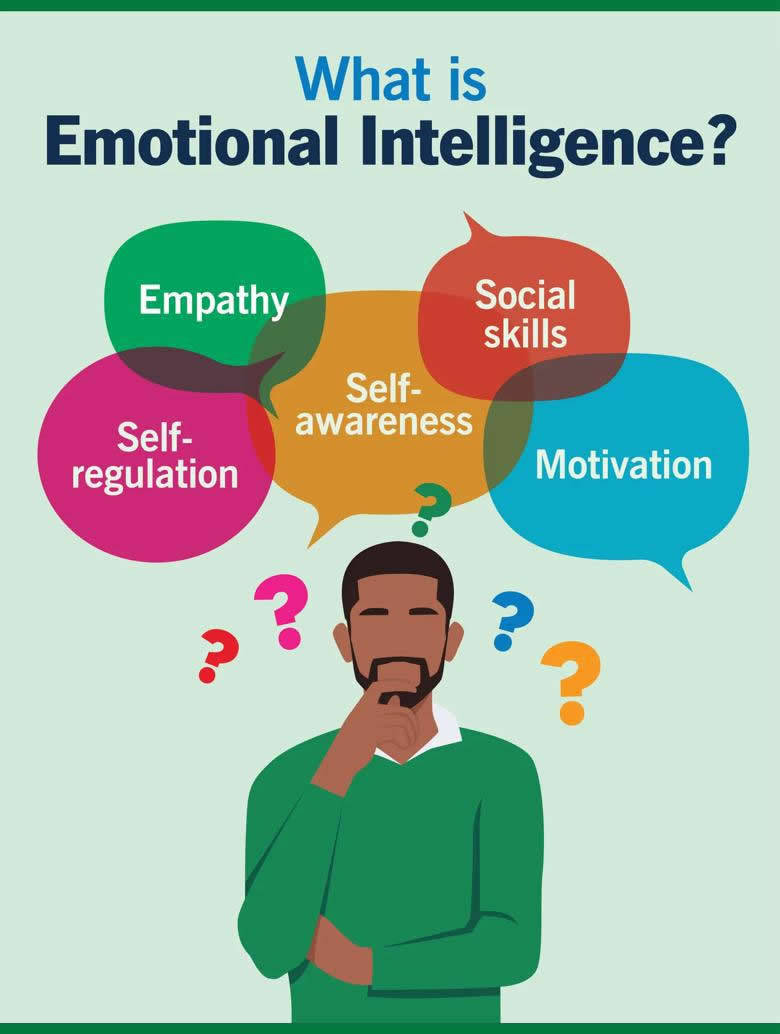What Your Emotional Intelligence Means for You
The more developed your EQ, the more in touch you are with your feelings, as well as with others’

Each of us approaches the world through our own unique lens, bringing a different combination of background, experiences, personality and emotions. So, it can often be difficult — if not seemingly impossible — to understand how anyone else could see things differently.
That’s where emotional intelligence comes into play. Also known as emotional quotient (EQ), this ability allows us to better manage our emotions while also helping us better understand and connect with others. And it’s a skill you can learn.
Health psychologist Grace Tworek, PsyD, shares just how emotional intelligence works and why it matters.
What is emotional intelligence (EQ)?

“Emotional intelligence is the ability to perceive, understand, comprehend and manage emotions,” Dr. Tworek explains. “EQ refers to how you recognize and respond to the emotions of others, as well as how you manage your own emotions and understand how they may be perceived by others.”
Emotional intelligence helps you see beyond your own view to comprehend how other people might be feeling, based on wherever they’re coming from. The higher your EQ, the more you’re able to identify, manage and even anticipate how you or someone else is feeling.
Emotional intelligence can play out in a lot of different ways and generally involves these three steps:
- Recognize where you are with your emotions.
- Actively try to understand what someone else may be feeling.
- Respond and interact with others in a way that’s honest, reflective and respectful.
Having more emotional intelligence doesn’t necessarily mean you’re a highly sensitive person, but you may feel things more strongly. When you have a heightened awareness of your emotions, you may experience a wider range of emotions, and you’re more likely to have more empathy. You’re also better able to manage your emotions.
But having high EQ may not always feel like a positive. Some people with high EQ are more vulnerable to “emotional contagion,” which is when you subconsciously mimic or take on the emotions of those around you.
Key components of emotional intelligence
When it comes to emotional intelligence, there are five key components:
- Self-awareness: This is the skill to recognize and acknowledge your own emotions, the impact of your experiences and how you’re feeling.
- Self-regulation: This is the ability to self-govern or manage your emotions, like how you respond to or react to others, and manage your natural impulses.
- Motivation: This is the skill to grow as a person and find ways for self-improvement.
- Empathy: This is the ability to appreciate where other people are coming from, even when their views, experiences and emotions are very different from yours.
- Social skills: This is the ability to engage and interact well with others and meet them where they are.
Why is emotional intelligence important?
Emotional intelligence can help you stay calm and collected under pressure, manage awkward moments with grace and relate to just about anyone you meet. It’s about managing your emotions instead of letting them manage you.
The more emotional intelligence you have, the better you are at understanding your feelings and the feelings of people around you.
In the workplace, higher emotional intelligence may look like:
- Actively listening to an employee’s frustrations and validating their feelings when they file a complaint
- Adjusting your tone and communication style to meet the needs of your audience during presentations and meetings
- Being attentive and present during important meetings and one-on-one conversations with your boss
In comparison, lower emotional intelligence may look like:
- Avoiding conflict resolution and leaving issues unresolved
- Dismissing a coworker’s feelings and not empathizing with their experiences
- Having difficulty accepting constructive criticism and responding to feedback
Emotional intelligence can also influence how you act and respond in other environments:
- If you have high EQ at home, you’re more likely to take responsibility for your actions and their impact on other people at home. If your EQ is low at home, you may suppress your emotions and have frequent outbursts when angry and faced with conflict at home.
- If you have low emotional intelligence, it might be harder to remove yourself from difficult or dangerous situations. But if you have high EQ, you’re more likely to recognize and avoid outside influences that can trigger negative emotions.
- When a friend or romantic partner is going through a difficult time, you might give them a gift or send them a sympathetic message to support them in their time of need if you have high EQ. But if your emotional intelligence is low, you may not recognize when someone is having a hard time. You may not even know how to respond appropriately or express your emotions in a way that’s appreciated.
“Emotional intelligence involves a lot of reflection and management of our own emotions because we really only have our own experience of emotions to play off of,” Dr. Tworek notes. “The more we’re able to gain understanding and ask questions to be able to relate to others, the better we’re able to put ourselves in someone else’s shoes.”
This can help you relate to people better, be more empathetic and remain grounded even amid difficult times. When we begin to recognize ourselves in other people, we come closer to comprehending how and why we grow into the people we are today.
Benefits of high emotional intelligence
High EQ comes with many benefits:
- Better communication
- Stronger empathy
- Quality leadership skills
- Healthier relationships with yourself and others
- Improved problem-solving and conflict management
- Improved decision-making
- Positive improvements to your overall well-being
It’s important to know that emotional intelligence is something that you can work on. Developing emotional intelligence takes time and dedication. But if this is something you think you would like to improve or if there are areas of your life that could benefit from more emotional intelligence, talk with a behavioral health specialist. They can offer guidance.